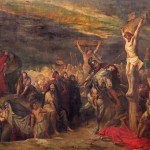Today we wrap up the deconstruction portion of my atonement series (you can find the rest, here) which thus far has looked at problems I see with the Penal Substitution theory of the atonement. In this final deconstruction post, I present the lingering questions Penal Substitution brings up in my mind. In our next post, I will begin to offer some ideas I think will help us rebuild a healthier and more biblical view of the atonement.
So, if Penal Substitution is correct, I have a few final questions:
Why did God prevent Herod from killing baby Jesus?
Think about this for a moment. Under the Penal Substitution version of the atonement, we are able to be reconciled to God because a sinless person (Jesus) was sacrificed to God in our place. If we reduce the atonement to such a primitive, isolated transaction (as I believe PS does), there is no reason why the atonement would not “work” had Jesus died death by another means.
Had Jesus died falling off a roof, in an unfortunate mule accident, or in any other scenario, it still would have technically “worked” because all that was needed is the death of an sinless human. Since Jesus never sinned and was not facing the natural consequence of sin (death) he did not owe his death– thus, any death would have worked.
So why the cross? Why not just let Herod slaughter Jesus as a baby? If God just needed the death of someone who didn’t owe him death, than there’s no reason to stop the death of baby Jesus.
None of this makes sense unless Jesus going to the cross had another function, purpose, or reason.
What about all those peeps in the Old Testament?
The argument of Penal Substitution posits that God needed the blood of the cross in order to forgive and be reconciled with us. But what about the folks in the Old Testament? Were not the OT believers reconciled to God and considered his people?
Strangely enough, in the OT we actually see what exists in the NT: the people of God are those who believe God, who trust in God, and who follow God. Those people are justified by their faith alone– we see this as early as Genesis 15:6 where it says that Abraham was considered righteous simply because he believed God (had faith).
Thus, the people of God in the Old Testament were reconciled to God without the cross, and they were reconciled the same way we are: by faith, and evidenced by lives of repentance. (And no, please don’t say they were reconciled because of animal sacrifice– we’ve already demonstrated that the Bible teaches this never worked and did not please God.)
Why was Jesus able to be in the presence of sinners?
Another primary foundation behind Penal Substitution is the idea that God cannot stand to be in the presence of sin. We’re told that because of the cross he can finally look at us, because when he does he sees the blood of Christ instead of sinful natures.
Now, I agree that sin is horrible, that sin results in death, and that we need to be freed from sin– but the idea that God needed a blood sacrifice to be in the presence of sinners is demonstrably untrue.
Why? Because Jesus was God in the flesh— and he not only hung out in the presence of sinners (which is everyone), but he actually preferred being with the sinners that everyone else thought were the worst of the worst. In fact, he did it so much that Jesus had the public reputation of being a glutton and an alcoholic.
If God absolutely, positively, cannot bear to be in the presence of sin without the blood of Jesus to cover his eyes, than God revealed in Jesus makes no sense. God in heaven cannot be in the presence of sin, but God in the flesh rushes to be in the presence of sin? God in heaven keeps his distance until sin is violently punished, but God in the flesh comes alongside sinners and lovingly invites them to return home?
Why was Jesus able to just freely forgive?
Finally, my last question along these lines is: Why was Jesus able to freely forgive people?
If his shed blood on the cross was a prerequisite of our forgiveness, and if God is unable to forgive us without a blood sacrifice to cover our sin, it once again makes no sense that Jesus freely forgave people on the basis of faith alone.
Were these people truly and completely forgiven for their sins? If they were, than we see (once again) that it’s possible to be totally forgiven from sin on the basis of faith alone, and that a blood sacrifice is not a perquisite.
…
These are the final questions/issues that come up for me when looking at the cross through the eyes of Penal Substitution.
As we turn to the next part of the series, we will look at the specific word Jesus used to describe what he was going to do on the cross. I believe that when we reexamine this word Jesus uses, it changes everything.
 Dr. Benjamin L. Corey is a public theologian and cultural anthropologist who is a two-time graduate of Gordon-Conwell Theological Seminary with graduate degrees in the fields of Theology and International Culture, and holds a doctorate in Intercultural Studies from Fuller Theological Seminary. He is also the author of the new book, Unafraid: Moving Beyond Fear-Based Faith, which is available wherever good books are sold. www.Unafraid-book.com.
Dr. Benjamin L. Corey is a public theologian and cultural anthropologist who is a two-time graduate of Gordon-Conwell Theological Seminary with graduate degrees in the fields of Theology and International Culture, and holds a doctorate in Intercultural Studies from Fuller Theological Seminary. He is also the author of the new book, Unafraid: Moving Beyond Fear-Based Faith, which is available wherever good books are sold. www.Unafraid-book.com.

















